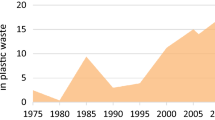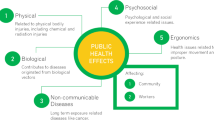Abstract
Scavengers, an important and legitimate group especially in developing countries, seem to have been virtually ignored by local municipalities in formulating solid waste management policies. Using researcher-administrated survey and semi-structured interviews, this study provides comprehensive information about human landfill scavengers in Kampala, Uganda, a developing nation. The results showed that the human scavengers consider waste picking as a full-time employment and not as a transitory form of urban employment. Also, the scavengers live in residential areas and not in squatter villages around the landfill. Scavengers’ exposure to flies is noted to be relatively high. The respondents do not engage in fierce competition involving pushing one another and that they often leave the collected items on the landfill without the concern of having the materials stolen. The relatively high level of trust among the scavengers can serve as a spring board for establishing scavengers’ cooperatives.
Similar content being viewed by others
References
Adeyemi AS, Olorunnfemi JF, Adewoye TO (2001) Waste scavenging in third world cities: a case study in Ilorin, Nigeria. Environmentalist 21:93–96
Agunwamba JC (1998) Solid waste management in Nigeria: problems and issues. Environ Manage 22(6):849–856
Asoman-Boateng R, Haight M (1999) Re-using organic solid waste in urban farming in African cities: a challenge for urban planners. IDRC, International Development Research Centre, Ontario
Babbie E (1986) The practice of social research. Thompson-Wadsworth, Belmont, CA
Binion E, Gutberlet J (2012) The effect of handling solid waste on the well-being of informal and organized recyclers: a review of the literature. Int J Occup Env Health 18(1):43–52
Birkbeck C (1978) Self-employed proletarians in an informal factory: the case of Cali’s garbage dump. World Dev 6(9/10):1173–1185
Blincow M (1986) Scavengers and recycling: a neglected domain of production. Labor Capital Soc 19(1):94–115
Furedy C (1984) Survival strategies of the urban poor: scavenging and recuperation in Calcutta. Geo J 8(2):129–136
Henry R, Yongsheng Z, Jun D (2006) Municipal solid waste management challenges in developing countries: Kenya case study. Waste Manag 2(1):92–100
Kulabako R (2005) Analysis of the impact of anthropogenic pollution on shallow groundwater in peri-urban Kampala. http://urn.kb.se/resolve?urn=urn:nbn:se:kth:diva-4077. Accessed 8 Nov 2006
Matagi S (2002) Some issues of environmental concern in Kampala, The capital city of Uganda. Environ Monit Assess 77:121–138
Matovu G (2002) City consultation on solid waste management and a strategic plan: case study of Wakiso District, Uganda. Report prepared for Municipal Development Partnership (MDP) and Urban Management Program (UMP) and UN Habitat. www.mdpafrica.org.zw/Publication/City%20Consultation%20Wakiso.pdf. Accessed 4 Mar 2007
Mbara T (2002) Transport: how have African cities managed the sector? What are the possible options? Paper presented at the Urban and City Management Course for Africa UMI, Kampala, Uganda, March 4–8, 2002
Medina M (2008) The informal recycling sector in developing countries: organizing waste pickers to enhance their impact. Gridlines 44:4
Medina M (2010) Solid wastes, poverty and the environment in developing country cities: Challenges and opportunities. United Nations University Working Paper # 2010/23, p 15
Medina M (n.d.) Globalization, development, and municipal solid waste management in developing countries, p 39
Musademba D, Musiyandaka S, Muzinda A, Nhemacha B, Tambwa D (2011) Municipal solid waste management challenges of Chinhoyi Town in Zimbabwe: opportunities for waste reduction and recycling. J Sustain Dev Afr 13(2):168–180
Nas PJ, Jaffe R (2004) Informal waste management: shifting the focus problem to potential. Environ Dev Sustain 6:337–353
Nzeadibe TC (2009) Solid waste reforms and informal recycling in Enugu Urban Area Nigeria. Habitat Int 33(1):93–99
Onibokun A, Kumuyi AJ (1999) Governance and waste management in Africa. In: Onibokun AG (ed) Managing the monster: urban waste and governance in Africa. International Development Research Center (IDRC), Ottawa, Canada, pp 44–100
Patrick PK (1983) Metropolitan waste management planning in developing countries. A case study in the Istanbul metropolis. In: Homes JR (ed) Practical waste management, Wiley, UK
Tevera DS (1994) Dump scavenging in Gaborone, Botswana: anachronism or refuge occupation of the poor? Georgrafiska Annaler 76(1):21–32
Wilson D, Velis C, Cheeseman C (2006) Role of informal sector in waste management in developing countries. Habitat Int 30:797–808
Wilson D, Araba A, Chinwah K, Cheeseman C (2009) Building recycling rates through the informal sector. Waste Manag 29(2):629–635
Author information
Authors and Affiliations
Corresponding author
Rights and permissions
About this article
Cite this article
Kimbugwe, E., Ibitayo, O.O. Analysis of characteristics, activities, and exposure to vermin of human landfill scavengers in a developing nation. Environ Syst Decis 34, 358–365 (2014). https://doi.org/10.1007/s10669-013-9466-1
Published:
Issue Date:
DOI: https://doi.org/10.1007/s10669-013-9466-1




